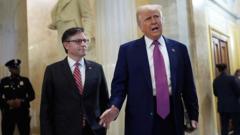In a tight vote of 215 to 214, the US House of Representatives passed a major tax and spending bill championed by President Donald Trump, representing a significant win for both Trump and House Speaker Mike Johnson. This legislation, which seeks to extend 2017 tax cuts and bolster defense funding, now moves on to the Senate, where its provisions may be modified.
House Republicans Pass Trump’s $5.2 Trillion Tax and Spending Bill

House Republicans Pass Trump’s $5.2 Trillion Tax and Spending Bill
The House narrowly approves a contentious multi-trillion dollar package aimed at tax cuts and increased defense spending, as President Trump celebrates this legislative success.
The passage of this "big, beautiful bill" was marked by internal divisions, as two Republicans sided with Democrats in opposition, and one chose to abstain from voting. Among its provisions, the bill temporarily abolishes taxes on overtime and tipped employment, aligning with promises made during Trump's ongoing presidential campaign. Despite Republican optimism, Democrats expressed grave concerns regarding the cuts to Medicaid and food assistance programs, predicting detrimental impacts on vulnerable populations across the nation.
Critics from the Democratic Party, including Minority Leader Hakeem Jeffries, voiced their fears over potential healthcare access loss for lower-income Americans, emphasizing the real-life ramifications of such legislative decisions. Furthermore, the bill is anticipated to add over $5.2 trillion to the national debt, inflating the deficit by about $600 billion in the next fiscal year, prompting warnings from financial analysts about the financial viability of such measures.
As the legislation proceeds to the Senate, adjustments may be made to navigate provisions that could trigger mandatory Medicare cuts, a politically sensitive issue that contradicts Trump’s commitments. With the looming midterm elections, Democrats are poised to leverage this vote against Republicans, raising public awareness of the potential effects of the bill as they seek to reclaim control of the House.
The evolving political landscape, coupled with a slim Republican majority, leaves the future of Trump's tax policy uncertain as the Senate prepares for its critical deliberations.
Critics from the Democratic Party, including Minority Leader Hakeem Jeffries, voiced their fears over potential healthcare access loss for lower-income Americans, emphasizing the real-life ramifications of such legislative decisions. Furthermore, the bill is anticipated to add over $5.2 trillion to the national debt, inflating the deficit by about $600 billion in the next fiscal year, prompting warnings from financial analysts about the financial viability of such measures.
As the legislation proceeds to the Senate, adjustments may be made to navigate provisions that could trigger mandatory Medicare cuts, a politically sensitive issue that contradicts Trump’s commitments. With the looming midterm elections, Democrats are poised to leverage this vote against Republicans, raising public awareness of the potential effects of the bill as they seek to reclaim control of the House.
The evolving political landscape, coupled with a slim Republican majority, leaves the future of Trump's tax policy uncertain as the Senate prepares for its critical deliberations.





















